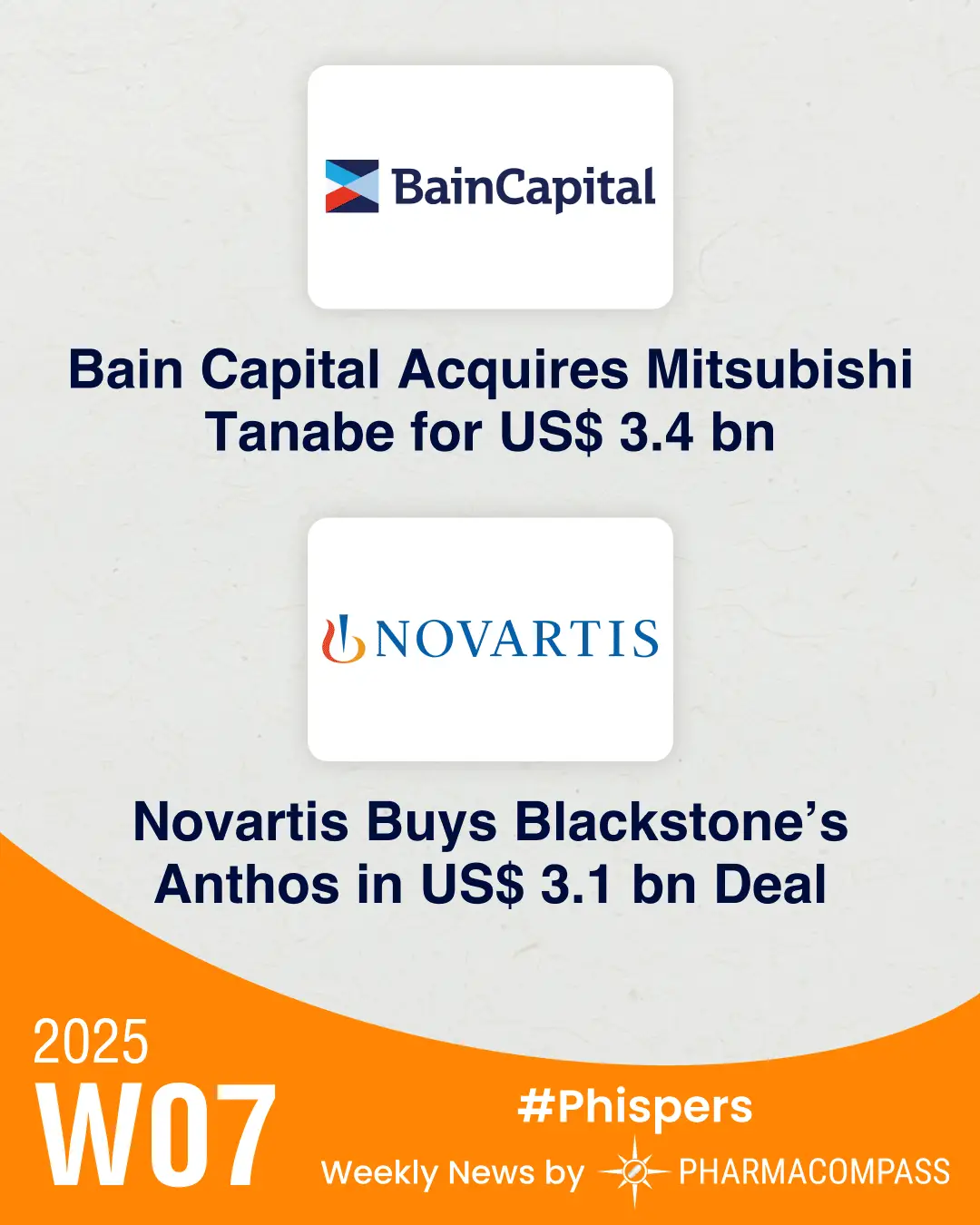
By PharmaCompass
2025-02-13
Impressions: 1,610 (Article) || 43 (Video)
In this week’s news, Bain Capital acquired Japanese pharma Mitsubishi Tanabe for US$ 3.4 billion. And Novartis acquired Blackstone-backed Anthos Therapeutics for up to US$ 3.1 billion, bringing the promising blood thinner abelacimab back into its portfolio.
Additionally, there was news that Germany’s Merck KGaA is in advanced talks to acquire SpringWorks Therapeutics. Interestingly, SpringWorks secured FDA approval for its genetic disorder drug, Gomekli this week.
In deals, AbbVie and Xilio entered into an over US$ 2 billion collaboration to develop novel tumor-activated immunotherapies.
Deaths from superbugs (i.e. antibiotic-resistant bacteria) have been rising globally. With resistance to older antibiotics growing, health regulators have been stressing the need for new treatments. AbbVie and Pfizer have responded and the US Food and Drug Administration (FDA) has approved their novel antibiotic Emblaveo for drug-resistant abdominal infections.
In regulatory news, FDA issued warning letters to Chinese API manufacturers Wuhu Nuowei Chemistry and Chengdu Innovation Pharmaceutical, placing both on import alert over quality control failures.
In news from clinical trials, Novo Nordisk’s bispecific antibody Mim8 delivered strong results in a pediatric hemophilia A trial. Roche’s blood cancer drug Gazyva showed promise in lupus nephritis (a kidney disease) in a late-stage study. And
Boehringer Ingelheim’s nerandomilast has achieved positive results in treating fibrotic lung diseases in a second, late-stage trial.
Bain Capital forays into Japanese pharma with US$ 3.4 bn Mitsubishi Tanabe buyout
US private equity firm Bain Capital has acquired Mitsubishi Tanabe Pharma, a subsidiary of Mitsubishi Chemical Group, for approximately JPY 510 billion (around US$ 3.4 billion). The Osaka-based pharmaceutical company specializes in treatments for central nervous system disorders, immuno-inflammation, and oncology, and operates in over a dozen locations across three continents.
Novartis acquires Blackstone’s blood thinner developer Anthos for up to US$ 3.1 bn
Novartis has agreed to buy Anthos Therapeutics — a drug development company majority-owned by investment firm Blackstone — for up to US$ 3.1 billion, with US$ 925 million paid upfront. Anthos was created through a partnership between Blackstone and Novartis to develop a new blood-thinning drug called abelacimab. The drug aims to prevent strokes and dangerous blood clots in patients with irregular heartbeat (atrial fibrillation). Now in phase 3 trials, abelacimab works differently from existing blood thinners by blocking Factor XI, an important protein that helps blood form clots.
FDA okays AbbVie-Pfizer’s novel antibiotic for drug-resistant abdominal infections
FDA has approved Emblaveo (aztreonam and avibactam), a novel intravenous antibiotic developed jointly by AbbVie and Pfizer, for the treatment of complicated intra-abdominal infections (cIAIs) in adults who have limited or no alternative treatment options. Emblaveo is to be used in combination with metronidazole to target Gram-negative bacteria, including drug-resistant strains. This approval addresses a significant public health concern, as cIAIs affect approximately 3.5 million people in the US annually and are a leading cause of sepsis in intensive care units. Antibiotic-resistant infections have made it more difficult to effectively treat intra-abdominal infections.
Amid takeover talks, SpringWorks’ Gomekli gets FDA nod for rare genetic condition
FDA has approved SpringWorks Therapeutics’ new drug, Gomekli (mirdametinib), to treat a rare genetic condition called neurofibromatosis type 1 (NF1) in both adults and children aged two years and older. According to a Reuters report, Germany’s Merck KGaA is currently in advanced talks to acquire SpringWorks Therapeutics.
NF1 causes tumors to grow along nerve tissues throughout the body. These tumors can cause severe pain and physical deformity, and sometimes they can’t be removed through surgery.
Gomekli is the first and only medicine approved for addressing this condition in both pediatric and adult populations with inoperable tumors.
AbbVie, Xilio in over US$ 2 bn oncology deal: AbbVie and Xilio Therapeutics have announced a collaboration to develop novel tumor-activated immunotherapies, including masked T-cell engagers. This partnership aims to combine AbbVie’s oncology expertise with Xilio's proprietary tumor-activation technology to create treatments that selectively target tumors while minimizing systemic toxicity and side effects. Xilio is eligible to receive up to approximately US$ 2.1 billion in contingent payments above the upfront payment of US$ 52 million.
Novo Nordisk reports strong results for children’s hemophilia treatment
Novo Nordisk’s investigational bispecific antibody Mim8 has met its primary endpoints in a late-stage pediatric trial for hemophilia A. Notably, 74.3 percent of the participants experienced no treated bleeds during a 26‐week period, and all 14 children taking the treatment with inhibitors reported zero treated bleeds. In addition to these impressive efficacy results, caregivers reported significant improvements in their children’s physical functioning and overall quality of life, with 98 percent preferring Mim8 over prior treatment regimens.
Roche’s blood cancer drug shows promise in lupus: Roche detailed promising clinical data for its blood cancer drug Gazyva (obinutuzumab) in lupus nephritis. In a recent late-stage study, Gazyva significantly reduced proteinuria and stabilized kidney function when combined with standard-of-care treatments, suggesting meaningful renal improvements for patients suffering from this severe complication of systemic lupus erythematosus.
Boehringer’s med shows promise in lung fibrosis: Boehringer Ingelheim has announced that its investigational drug, nerandomilast, has achieved positive results in treating fibrotic lung diseases in a second late-stage trial. Nerandomilast met its primary endpoint in patients with progressive pulmonary fibrosis (PPF) by demonstrating a significant improvement in forced vital capacity (FVC) over 52 weeks compared to placebo. FVC is a key measure of lung function, assessing the volume of air a patient can exhale forcefully.
FDA puts two Chinese API makers on import alert over quality control breaches
Chinese API manufacturers Wuhu Nuowei Chemistry and Chengdu Innovation Pharmaceutical have been placed on US import alerts due to significant deficiencies in their quality control and testing procedures.
Wuhu Nuowei, which labels some API shipments “for R&D only,” raised concerns when the FDA found that the quantities shipped were inconsistent with typical research needs. It has since stopped exporting APIs to the US and is no longer registered as a drug manufacturer. FDA also noted that Wuhu Nuowei failed to validate its purity testing methods and did not provide complete raw stability data, casting doubt over its scientific rigor.
Similarly, Chengdu Innovation Pharmaceutical did not adequately test incoming raw materials used in products, nor did it maintain a robust quality unit to oversee its manufacturing processes. The FDA has recommended that Chengdu hire a third-party consultant to address these issues, warning that failure to improve could lead to its new drug applications being blocked.
The PharmaCompass Newsletter – Sign Up, Stay Ahead
Feedback, help us to improve. Click here
Image Credit : Phisper Infographic by PharmaCompass license under CC BY 2.0
“ The article is based on the information available in public and which the author believes to be true. The author is not disseminating any information, which the author believes or knows, is confidential or in conflict with the privacy of any person. The views expressed or information supplied through this article is mere opinion and observation of the author. The author does not intend to defame, insult or, cause loss or damage to anyone, in any manner, through this article.”







